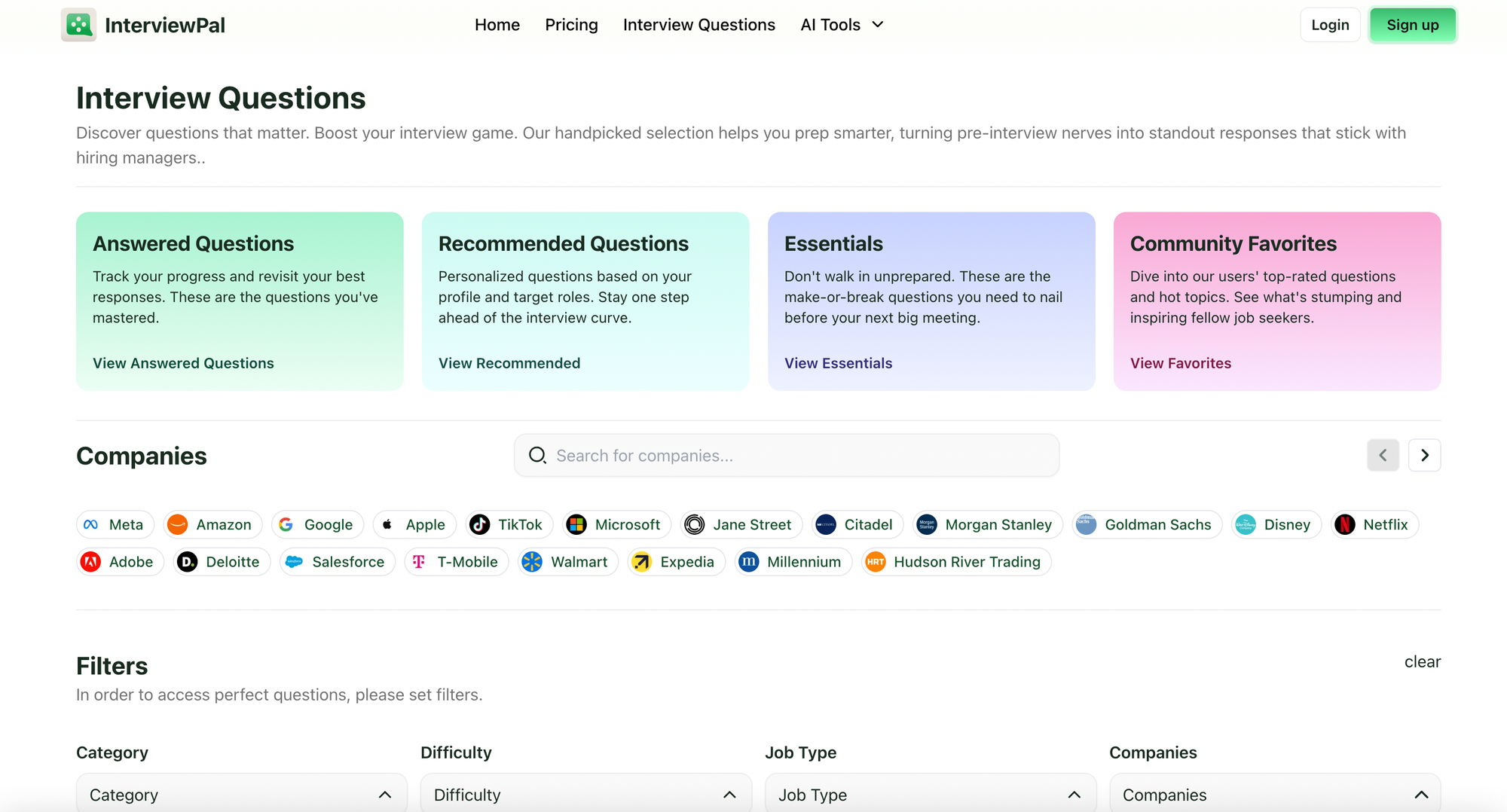When an interviewer asks “Why do you want to work here?”, they want to know if you truly understand and connect with their company. It’s not a trick question, it’s a chance to show you’ve done your homework and that your values and goals align with theirs. In fact, hiring managers use this question to assess fit: do you appreciate what makes their organization unique, and will you bring genuine enthusiasm to the role? The best answers are specific to the company and role - they go beyond generic praise and demonstrate real insight. Career experts suggest structuring your answer to cover a few key points:
- Show you’ve researched the company’s mission, culture, or recent work. Identify a specific aspect that truly excites or inspires you (e.g. a mission, value, product, or initiative). This proves you understand “why they exist beyond just making money” and care about what they do.
- Connect that company insight to your own passions or experience. Maybe the company’s mission resonates with your personal values, or you’ve been a long-time user of their product. Sharing a personal or professional connection makes your motivation authentic. (As one Harvard Business Review post advises, “express your personal passion for the employer’s product/service/mission.”)
- Highlight alignment with the role and what you bring. Tie your skills and career goals to what the job involves. Show that you enjoy the kind of work you’ll be doing and have the relevant strengths, this assures them you’ll excel in the position and be fulfilled.
- Explain how you envision contributing. Paint a picture of how you’ll apply your skills to advance the company’s goals. Employers love to hear that you “can see yourself succeeding in the role” and making an impact with your unique background.
The focus should be on them, not just you. As career coach Stephanie Brown notes, most people answer this wrong by focusing on themselves instead of the company. The interviewer wants to hear that you believe in the company’s purpose or values the way they do. So avoid surface-level responses (like “I hear you pay well” or “This would look good on my resume”). Instead, zero in on what makes the company special and how that ties into your story and ambitions. Being genuine and specific is key – there’s no one “right” answer, but the best answers are authentic and value-aligned.
Below, we’ve compiled effective example answers for “Why do you want to work here?” at several high-profile companies across different industries. Each example, for both early-career and experienced candidates – highlights a real insight about the company, a personal connection, alignment with the role, and how the candidate plans to contribute. These examples draw on actual company values and expert advice, illustrating a genuine tone and detailed specificity (and avoiding the generic answers hiring managers have heard too often!).
Examples of Good Answers to “Why Do You Want to Work Here?”

💡 Company Snapshot: Google is known for its mission-driven culture and innovations that impact billions of users. An authentic answer will often reference Google’s mission or its famed culture of innovation and learning, coupled with a personal tech passion or project. Google recruiters have noted that there’s no single “right” answer – what matters is showing why Google is unique to you and aligning with Google’s values
Entry-Level Example (Google)
“I’ve been drawn to Google ever since I discovered how powerful Search can be. Google’s mission ‘to organize the world’s information and make it universally accessible and useful’ really resonates with me - in fact, I remember using Google in high school to help me learn programming basics on my own. That experience inspired me to pursue computer science in college. I love that Google is always pushing the boundaries of innovation (like your work in AI and quantum computing), and it’s exciting to think of joining a company where creative ideas are encouraged. As an entry-level software engineer, I’m especially excited about the scale here: tools I help develop could potentially impact millions of users. I’ve done projects in information retrieval and data analysis, so I can’t wait to apply those skills on products like Google Search and grow alongside some of the brightest minds in the industry. Most of all, I want to contribute to Google’s next generation of innovations while upholding the user-focused values that have made me a fan of Google in the first place.”
Why it works: This answer shows genuine enthusiasm for Google’s mission (even quoting it directly), and ties it to the candidate’s personal story of learning to code. It highlights Google’s innovation (AI, quantum computing) and the scale of impact, which signals the candidate did research and understands Google’s global reach. The candidate aligns their skills and projects (information retrieval, data analysis) with Google’s products, and expresses excitement to contribute and learn in Google’s environment. It’s specific, heartfelt, and clearly not an answer that could fit just any company.
Experienced Example (Google)
“With over 8 years in software engineering (including time at a FAANG company), I’m eager to join Google because of its unparalleled culture of technical innovation. Google’s deep technical culture is a huge draw – I completed a PhD in computer science, and I know at Google I’d be working alongside colleagues who are just as excited about tackling advanced tech challenges as I am. I also admire Google’s spirit of innovation, for example, the famous 20% time policy really exemplifies how Google encourages creativity. Even if it’s not a formal rule anymore, that mindset of pursuing bold ideas is alive and well, and it’s something I value deeply. In my current role I actually started an “innovation Friday” initiative where our team could prototype new ideas and it boosted our team’s retention by 15% because people loved it. Google strikes me as the kind of place that celebrates this innovative spirit. Finally, I have two former grad school colleagues who joined Google and have shared how much they’ve grown from the collaborative, mission-driven projects here. Hearing their passion sealed my interest. I want to bring my expertise in machine learning and my love for creative problem-solving to Google’s products – I can see myself succeeding here by contributing fresh ideas and rigorous research experience to a team that’s building solutions for billions of users.”
Why it works: This experienced-candidate answer is packed with specifics and authenticity. It cites Google’s innovation culture (even mentioning the famed “20% time” policy) and connects it to the candidate’s own initiative to foster innovation – including a concrete result (15% retention improvement) as proof of impact. The candidate shows they value the technical excellence at Google (relevant for a PhD-level engineer) and even references knowing current Googlers, which adds credibility to their understanding of Google’s culture. They clearly outline how they’ll contribute (machine learning expertise, creative problem-solving) to Google’s mission. This answer is compelling because it’s genuine (driven by passion for innovation) and tailored to Google’s identity, exactly what Google interviewers want to hear.
Amazon
💡 Company Snapshot: Amazon looks for candidates who align with its intense, customer-centric culture. In interviews, they often probe your understanding of Amazon’s Leadership Principles (there are 16 of them) and your ability to embody them. Great answers to “Why Amazon?” frequently reference a principle (like Customer Obsession or Invent and Simplify), a personal experience with Amazon’s products or services, and a readiness to work at Amazon’s massive scale and pace. Authenticity is key here, Amazon wants to see genuine excitement for their way of doing things, not just generic praise.
Entry-Level Example (Amazon)
“I want to join Amazon because of the impact and learning opportunities I see here. As a recent computer science grad, I’m amazed by how Amazon Web Services powers so much of the internet – that aligns with my passion for cloud computing and scalability. I actually did my senior project on optimizing cloud databases and frequently cited AWS innovations, which got me really excited about Amazon’s technology. I also really connect with Amazon’s Leadership Principles, especially “Learn and Be Curious”. In college and during internships, I was the person who always volunteered to dive into new, unfamiliar projects – I love continuously learning. For example, I taught myself a new programming framework to improve an app at my internship, because I saw a chance to make it better for customers. That mindset is a perfect fit for Amazon’s fast-paced, innovative culture. In this role as a Software Development Engineer, I’d be thrilled to work on services that scale to millions of users. I’m confident I can grow quickly here and contribute by building reliable, customer-focused solutions, all while embracing the high standards that Amazon is known for.”
Why it works: This answer highlights an authentic enthusiasm for Amazon’s technology and scale (AWS powering the internet) and ties directly to the candidate’s academic project – showing a real connection rather than a superficial remark. The candidate explicitly mentions a Leadership Principle (“Learn and Be Curious”) and gives a personal example of embodying that principle during an internship. This shows cultural alignment and initiative. The answer also points out the role fit (“Software Development Engineer working on services at massive scale”) and conveys that the candidate is excited to learn and contribute to Amazon’s customer-focused innovations. It’s not just “Amazon is great”; it’s why it’s great to them and how they plan to add value.
Experienced Example (Amazon)
“I want to work at Amazon for three main reasons. First, I’ve always admired Amazon’s obsession with customers. One of Amazon’s core principles is Customer Obsession, and I experienced it first-hand when I had an issue with an order, the customer support was amazingly responsive. In my own work as a product manager, I’ve tried to bring that same focus on the customer. In fact, I led an initiative at my current company to overhaul our support ticket system based on customer feedback, and we reduced complaint volume by 20% as a result. Knowing that Amazon lives and breathes customer-centricity makes me excited to contribute in that environment. Second, a former colleague of mine joined Amazon a couple of years ago, and she often talks about how much she’s learned and grown there. The idea of working with and learning from top talent in product management is very appealing to me as I continue to hone my skills. Third, I’m excited about Amazon’s innovation in digital media. I’ve spent the last five years in the streaming video space, and I’ve been really impressed by how Amazon Prime Video has expanded and invested in original content. Joining the Prime Video team would let me combine my domain experience with Amazon’s resources to create even better experiences for viewers. Overall, Amazon’s scale, culture of innovation, and customer-first mindset are exactly what I’m looking for, and I’m confident I can hit the ground running and deliver results here.”
Why it works: This seasoned candidate’s answer is neatly organized (even enumerating the reasons) and full of company-specific passion. They start with Customer Obsession, one of Amazon’s hallmark values, and give a concrete anecdote of how they personally improved customer experience at their last job, quantifying the impact (20% reduction in complaints)
This not only shows alignment with Amazon’s values but also demonstrates competence. They then mention a personal connection (a colleague’s positive experience at Amazon) to reinforce cultural fit and learning opportunities. Finally, they align their industry experience (streaming media) with Amazon’s business (Prime Video), which shows foresight in how they’d contribute. The answer comes off as genuine and well-researched, it’s clear why Amazon specifically is their target, not just any tech company.
JPMorgan Chase
💡 Company Snapshot: JPMorgan Chase is a global financial leader with a long history. A strong “Why us” answer for JPMorgan (or similar banks like Goldman Sachs or Morgan Stanley) will often emphasize the firm’s prestige and scale, but more importantly why that matters to you. Top candidates reference specific aspects like JPM’s industry-leading practices, global reach, or values (e.g. teamwork, community impact). Showing that you understand what sets JPMorgan apart from other banks - and how your goals align is crucial. Hiring managers also appreciate when you can mention any personal connections (networking, mentorship, or internship experiences) that sparked your interest, as it shows you’ve made an effort to engage with the company. The key is to convey genuine enthusiasm for JPMorgan’s place in the finance world and how you plan to add to it, rather than a generic “it’s a big name” answer.
Entry-Level Example (JPMorgan Chase)
“I want to work at JPMorgan for two main reasons. First, as someone beginning my finance career, I’m excited by the sheer scale and influence of JPMorgan. It’s not just that JPMorgan is a top bank, it’s that the bank’s work truly shapes global markets. I read that JPMorgan’s market capitalization is more than three times that of some competitors, which to me signals an opportunity to learn at the very forefront of the industry. If I’m going to be advising investors or working on big deals, I’d love to do it at a firm that already provides so much value to its clients and shareholders. Second, I had a mentor during my business internship – Madhu Vijay – who is a director at JPMorgan. Her guidance and the way she talked about JPMorgan’s culture really inspired me. She highlighted how collaborative the teams are and how much internal mobility there is in the company, encouraging me to apply. From her stories, I got the sense that JPMorgan invests in its people’s growth. As a new analyst, that is exactly the environment I’m looking for: a place with unmatched learning opportunities, supportive leaders, and the chance to contribute to high-impact projects. I’m confident that at JPMorgan I can grow into the finance professional I aspire to be, while contributing my strong work ethic and fresh perspective to the team.”
Why it works: This entry-level candidate zeroes in on JPMorgan’s unique strengths, its scale and industry leadership (backed up with a specific fact about market cap, showing the candidate did their research). They connect this to a personal desire to be “at the forefront of the industry,” which feels genuine rather than just “I want a big name on my resume.” The second part leverages a personal mentorship experience: the candidate actually names a JPMorgan director who mentored them and shares what impressed them about the culture (collaboration, mobility). This not only shows they’ve built relationships (a big plus), but also that they admire JPMorgan’s culture of developing talent. The answer balances what they’ll gain (learning, growth) with what they’ll give (hard work, a fresh perspective on the team). It’s specific to JPMorgan and to the candidate’s own journey, a combination that makes it memorable.
Conclusion
The question “Why do you want to work here?” isn’t just a formality, it’s one of the clearest signals to employers that you’ve done your homework, thought seriously about the fit, and genuinely care about joining their team. The best answers aren’t rehearsed slogans or generic praise, they’re rooted in research, personal alignment, and a clear vision of how you’ll contribute.
Take time to reflect on what truly draws you to the company. Study their mission, recent work, and culture. Then, practice saying your answer out loud, not to memorize it, but to own it. If possible, run it by a trusted friend or mentor who’ll give you honest feedback.
You only get a few minutes to make them believe you belong there. Make sure your answer gives them a reason to believe it too.



